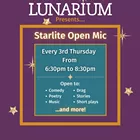Descending into the mildly claustrophobic Spokane Valley basement of Creative Music Learning Center isn't an experience that screams pop music. Sitting unassumingly along Sprague Avenue's commercial corridor, the building serves as a hub for locals seeking private music instruction. In a tiny corner room downstairs, Spokane's Rosie CQ crafts a unique style of music you've likely never heard before — vibraphone pop.
Rosie CQ HQ is packed tight: a vibraphone and marimba parallel flank the center space, a drum kit sits against the back wall, crammed shelves jammed under the pitched ceiling overflow with bells, tambourines and books, and Rosie's desk rests neatly tucked in the corner. The most striking feature of the room — literally and figuratively — has to be the bags of mallets draping either side of the door. Over two dozen varieties of the sticks make up a rainbow array of kinetic musical potential, including Rosie's signature line of BlueHaus mallets with their forest green yarn heads.
A classically trained percussionist, Rosie CQ (Rosie Cerquone) mainly teaches drum lessons by day, but then devotes her personal music time to creating a brand of music all her own, one where she's singing while guiding her mallets across the vibraphone's metallic bars.
"[When I was a kid] I started playing stuff on guitar," Rosie says, "but I was never very comfortable with guitar. And so when I started becoming really comfortable with four mallets (the process where a percussionist holds two mallets in each hand to achieve chords and more complex sounds), it actually was just such a natural step for me to start playing that as my chordal instrument while being able to sing. I think they're some of the most beautiful instruments just to listen to.
"I chose vibraphone over something like marimba," she continues, "because... one, honestly, it's just so much more portable that I can bring it places. But also I feel like just with the pedal that it has, you can actually sustain notes on this instrument, unlike marimba. I felt like it added so much versatility to what I could do. You just have so many more options for peaks and valleys in your own music, whether you're playing alone or with a group of musicians."
The results of this uncommon combination can be heard on her 2021 debut album, The How and the Why.
The album establishes an airy dreamscape from the opening notes of "Lullaby," as the chiming vibraphone notes underscore Rosie singing about the desire for company on sleepless nights. The album simultaneously delivers a warm and sparse listening journey. It features only vibraphone, drums, auxiliary percussion and vocals, but Rosie layers the elements and her own harmonies to flesh out the gaps. It's easy to get lost mentally drifting like a feather on the breeze when listening to tunes like "Fly" and "Anthem," while songs like "12" sport a more aggressively energized feel. And there's simply a refreshing and invigorating experience to hear songs with a melodic sensibility set against such atypical instrumentation.
Rosie says she's influenced by a host of musical sources — from folk acts like Punch Brothers and Brandi Carlile to modern pop superstars like Olivia Rodrigo and Billie Eilish (both of whom Rosie has been known to cover live). And while no one would mistake the experimental dream pop of The How and the Why for the streamlined pop rock of Rodrigo's Sour, the album covers some of the same ground lyrically.
"I felt like thematically [the album's songs] work together because they were a lot about the same things of figuring out why I was doing anything in my life really. (Laughs) Especially in that you know, aged 16 to 22 years of life."
A Missoula, Montana native, Rosie was always a music kid growing up, starting with guitar before taking up percussion in fifth grade band. Her draw to the mallet instruments like bells and xylophone was almost immediate, and by eighth grade she was taking lessons focused on honing her four-mallet skills.
Staying in her hometown, she studied percussion performance at University of Montana, where she dabbled in a bit of everything — drum set, orchestral percussion, world percussion — but honed her focus to mallet instruments, specifically the vibraphone.
"With vibraphone it definitely can be challenging sometimes to get the sound that I want in my head," she says. "You do have to take into account that it doesn't sound necessarily as lush harmonically. [With] guitar or piano, we're just used to these really, really full-sounding instruments."
Rosie CQ had been writing the songs that would comprise The How and the Why over six years, but she needed motivation and for other people to hold her accountable to actually make the record a reality.
"My senior year of college, I just kept telling people I was gonna make an album and I didn't actually know how it was gonna happen," she says. "I was like, 'Well I guess I have to do it now.'"
After earning her degree in 2020, Rosie moved over to Spokane, following her partner Haydn Halsted, who also serves as her drummer. Having also earned a Sonic Arts Certificate from UM, Rosie went about recording the album mostly in her bedroom.
"I wanted to create this album because I knew coming out of college that I had all this music and I didn't want it to just, like, disappear," Rosie adds. She's progressing on what will be her second album, which she hopes to take in a much more pop direction than her debut.
"I think my songwriting influence has changed quite a bit in the last few years," Rosie says. "If you listen to The How and the Why, it definitely has pop elements, but it also reads very much like somebody that was steeped in the classical percussion tradition. And I still pull from that, but more and more I'm trying to pull from some of my favorite pop artists just as far as song structure to make it a little bit more accessible to all kinds of people."
While she won't begin recording album No. 2 until 2022, expect a lot of the new, poppier songs when Rosie CQ plays her first show at Lucky You on Friday, opening for Spilt Milk and Cuchulain. Mainly, she just hopes that people are receptive to exploring her unique sonic niche.
"I would just invite people to listen to all music that has a strange instrumentation with an open mind because I think we're really quick to to look at a stage with weird instruments on it and be like 'Oh this is going to be strange,' or 'This is going to be not something that I necessarily like,'" says Rosie. "But I think more than often the instrumentation is something that we can play with so much more in pop music than is normally played with. I would love for [people] to come hear what vibraphone pop sounds like." ♦
Spilt Milk, Cuchulian, Rosie CQ • Fri, Oct. 22 at 8 pm • $12-$15 • 21+ • Lucky You Lounge • 1801 W. Sunset Blvd. • luckyyoulounge.com • 509-474-0511

























